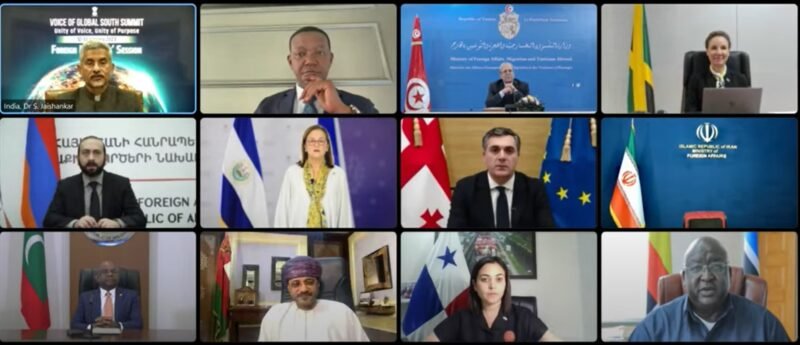EAM Jaishankar Leads Virtual Summit on ‘Voice of the Global South’ with Participation from 120 Developing Countries

Indian External Affairs Minister Dr S. Jaishankar addressed a two-day special virtual summit titled “Voice of the Global South Summit” on January 12, 2023, which was attended by dignitaries from over 120 developing countries.
In his opening remarks, he stated that “the voice of the Global South Summit is conceived as a platform for developing countries to share their concerns, perspectives, and priorities.” He argued that the key concerns of the developing world are not being captured in the debates and discussions, whether it is the impact of the COVID pandemic, climate change, terrorism, ongoing conflicts, or debt crises. With this in mind, he stated that India’s presidency of the G20 will ensure that the perspectives and priorities of the global south are not only articulated but also properly discussed in its debates.
EAM added that the Global South Sensitive model of globalization is much needed in this hour to become stronger. India stands for three fundamental shifts
- Model of Globalisation that shifts from a self-centred to a human-centred approach: This entails putting a stronger emphasis on overall development.
- A new approach to innovation and technology: Moving away from being on the receiving end of tech patronage and toward deploying global, south-led innovations for societal transformation.
- Development cooperation: From debt-creating projects to a demand-driven and sustainable form of cooperation.
Further, he expressed concern about how the world is getting more volatile and uncertain for the South. “Against the backdrop of unkept promises, developing countries are also expected to bear the burden of developing climate resilience, industrialising without carbonization, managing escalating climate events, and lifting millions out of poverty, all while managing disruptions and uncertainties in global supply chains,” he said.
Additionally, he stated that “people who were promised an interconnected world today actually see a world with higher walls, is insensitive to social needs, and is discriminatory in its health practises.”
Furthermore, he stated that India would endeavour to de-centralise and de-risk globalization. According to him, such a model would provide more opportunities to more nations, strengthen the urge to foster localization, improve connectivity, and reconfigure supply chains to ensure economic security.
On innovation and technology, he said that “India is ready to share its experiences and expertise, including our game-changing digital public goods in universal identification, financial payments, direct benefit transfer, digital health, commerce, industry, and logistics.” He asserted that they will be both accessible and affordable to people of the global south.
While concluding his speech, he applauded India’s record and said, “India’s record speaks for itself.” He said India’s development projects in 78 countries are demand-driven, transparent, empowerment-oriented, environmentally friendly, and rely on a consultative approach, all while ensuring respect for sovereignty and territorial integrity. Lastly, he talked about how India emerged as an education and healthcare hub for the global south.


















